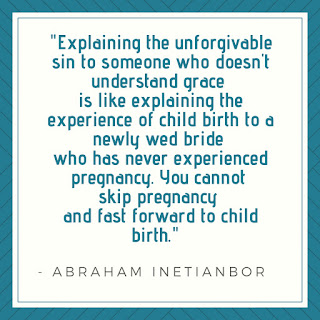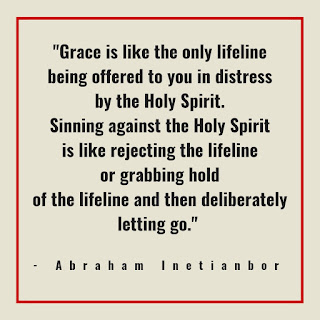If you haven't done so yet, I strongly suggest to first go study and understand what the Grace of God is before reading this piece. It will help you get a better picture of what this unforgivable sin really is in biblical terms.
The UNFORGIVABLE sin = BLASPHEMY= Sin against Holy Spirit = Rejecting Grace = Bearing fruit of the evil spirit = Rejecting the Holy Spirit = Rejecting God. Those who are not Christians are considered a blasphemer just like Paul considered himself a blasphemer when he was yet to be converted (1 Timothy 1:13). Those who were once Christians and left the faith are also considered as blasphemers (1 Timothy 2:18-20).
Christians sin but they do not practice sin. Let's say you drowning and the Holy Spirit came to your aid with the lifeline that can save your life. You rejected it or you deliberately let go after first holding on. Basically, sin against the Holy Spirit is like telling the Holy Spirit to "go kick rocks" when you're being offered the lifeline call grace. Why is this sin against the Holy Spirit different from "sin" you may ask. It is different because grabbing hold of the lifeline (grace) and "slipping off" is not the same as deliberately letting go. The two thieves on the cross is a good example to consider when thinking about sin that may be virtually the same but one led to death for lack of repentance and the other through belief and repentance made it to paradise with Jesus. They both were sinners but only one recognized his sins (Luke 23:32-43) and was given life. Even if the Church didn't begin yet at this time, Jesus is still Jesus and had the authority/power to save. It's just like Peter did when he took his eyes off Jesus (Matthew 14:22-33). The cry for help by Peter showed he recognized his mistake and then his repentance was followed by action when he reached out to accept Jesus' hand showing willingness to be saved. Those who outright reject or deliberately let go have no interest in honest repentance. The good news is, the lifeline will always be available to those willing to gab it and hold on. Your time only runs out when you take your last breath, which can be any day.
When Jesus spoke about this sin in Matthew 12:31-33, he also clarified what he meant. It was insane for the Pharisees to have doubt about Jesus being the "Son of Man" or God in the flesh but they crossed the line when they rejected God by suggesting that it was possible for a demonic spirit to drive out another demonic spirit from inside one person, which is something that only the Holy Spirit can do. In the same way, it is insane when Christians sin or nail Jesus back on the cross but we cross the line when we reject the gift of the Holy Spirit that came as a result of that death by practicing sin as a way of life with no remorse (Roman 6:1-3) or godly sorrow (2 Corinthians 7:10). Christians sin but they do not practice sin (1 John 3:6-10) and this is why Jesus followed up His statement by clarifying with the analogy of a tree and its fruit. He did the same thing in John 15 when He gave a lengthy speech about The Vine and the branches (bear fruit). And in closing, He spoke about the Holy Spirit that will come from the Father. Only two spirit exist - one is evil and one is Holy. Evil spirit has its fruit (HATRED) and the Holy Spirit has it's fruit (LOVE) - they cannot co-exist or grow from one tree.
So sin against the Holy Spirit is simply when we only want to produce evil fruit that drives out the Holy Spirit from inside us by dishing God for evil and never looking back - there is no forgiveness for this. I call it the ultimate sin with no name because it embodies everything we know about LIVING IN SIN or sinfulness. The rejection in Hebrews 10 is a deliberate act to ignore or forsake (2 Peter 2:20-22, Proverbs 26:11, Hebrews 10:25). When you read the book of Hebrews or at least the entire chapter 10 of Hebrews, you'll understand where the writer is coming from before verse 29. Some Christians simply stopped worshiping God because they rightfully believed that the once and for all death of Jesus that took away their sins by grace is all they needed. There was no need for the frequent bulls and goats sacrifices. Their mindset became once saved forever saved and no need to remain faithful. This is why they were challenged in verse 25 to keep worshiping God because deliberately ignoring or forsaking worship will constitute a rejection of the Holy spirit that they have received when they accepted the gospel and the grace of Jesus Christ.
The only sin against grace or the Holy Spirit is deliberate (Hebrews 10:26) rejection of this Holy Spirit as made clear in Hebrews 10:28. The key word here is rejection. The Hebrew writer, which I strongly believe is Paul was making a comparison when he cited the rejection of the law under Moses and the consequences that followed. In the same manner, verse 29 makes it clear that such rejection of grace or the Holy spirit will result in spiritual death, which happens after judgement. Remember, under the old law as mentioned in that scripture, the condemnation occurred after the testimony of the witnesses. In the same way, our judgement is sealed the day we physically die (before or at His coming). God is serious about the consequences of rejection or forsaking Him. He was serious in the old testament with the physical Israelite (2 Chronicle 7:19-22) and today in the new testament with the Spiritual Israelite (Romans 6:19-23).
Grace is the Holy Spirit that we trample on (Hebrews 10:29) when we continue in sin and this continuation in sin is a result of our worldly sorrow. The scripture says we cannot continue in sin or practice sin for grace to remain (Roman 6:1, 1 John 3:6-10) and those who continue to "practice" sin, no longer have God. Practice is something you continue to do with the intent to get comfortable doing or better at it. Something you do every now and then with no intentions of making it part of your life is not considered practice. If godly sorrow produces repentance, worldly sorrow does the exact opposite. Worldly sorrow (2 Corinthians 7:10) is that attitude or behavior against the Holy Spirit that cannot be forgiven. When we FEEL BAD in stead of GLAD for NOT committing a SIN because we want to please the crowd, this mindset leads us to continue in sin and be ALIVE in sin instead of being DEAD to sin. When we prefer to drown in the pool (worldly ways) and reject grace (the lifeline), there's nothing that can be done.
Our hearts become seared (1 Timothy 4:1-2) when we no longer have that godly sorrow or conscience that acknowledges wrong doing in order to create repentance. We no longer see wrong as wrong, instead, we intentionally find ways to defend wrong doings either by saying things like: "who cares?" "Everyone does it." "What's the big deal." "He or she doesn't have a filthy mouth, they're just saying what we all are thinking." "No one is perfect." When we care more about creating these excuses more than repentance, then I believe we are just digging a hole for ourselves. The time we spend defending sinful acts can be spent encouraging one another unto good works. When the physical body dies, it means we stop breathing that breath of life. When we die spiritually, our spirit looses the spirit (grace) of God that gives life to our soul. Jesus is the source of the spiritual lifeline (power) that we plug into spiritually and when we get cut off from the power source, we loose that connection to salvation, eternal life or the forgiveness of sins. This is why there is no more forgiveness after judgement or after death hence this sin cannot be forgiven.
The Holy Spirit, which Jesus promised to send, arrived in Acts chapter 2 only to the Apostles. They in turn delivered the life changing message that would allow the Spirit to dwell in us - Christians. But we do not have the miraculous power that they had because it ended with those they specifically placed their hands on for the purpose of spreading the gospel. We have the Bible so we have no need for such. This would be a subject for another day. The day of Pentecost is when people for the first time started receiving the gift of the Holy Spirit, which is grace and grace is the power of God to save. Without it, we can't be saved, not matter how good we may think we are.
















